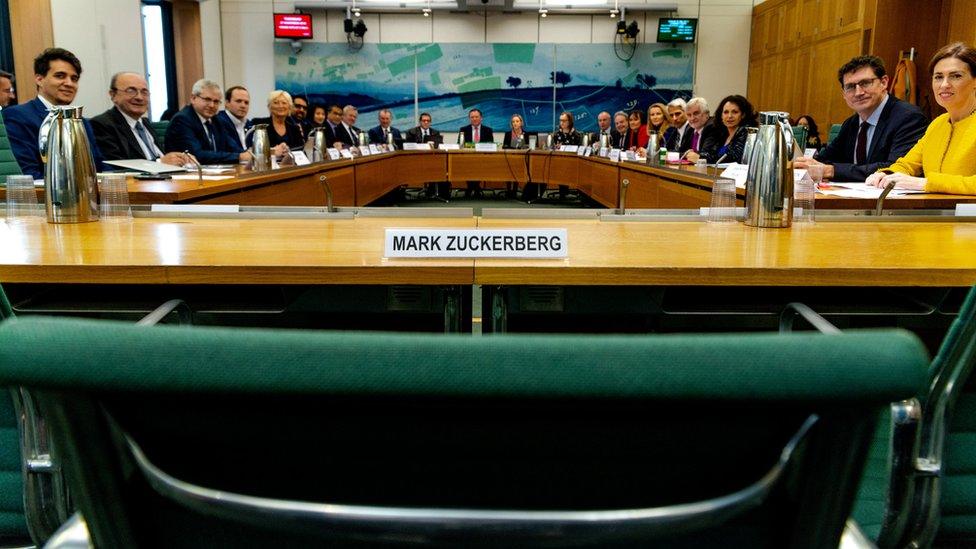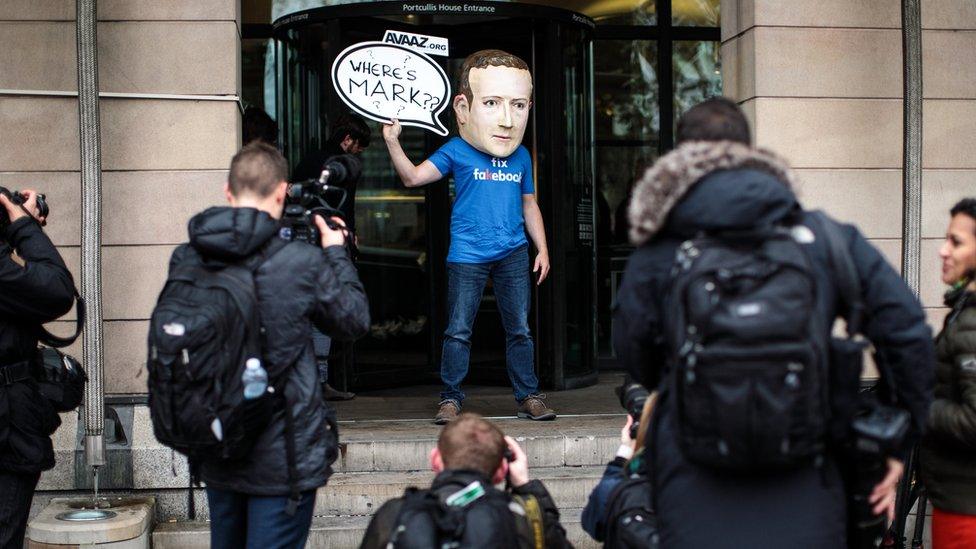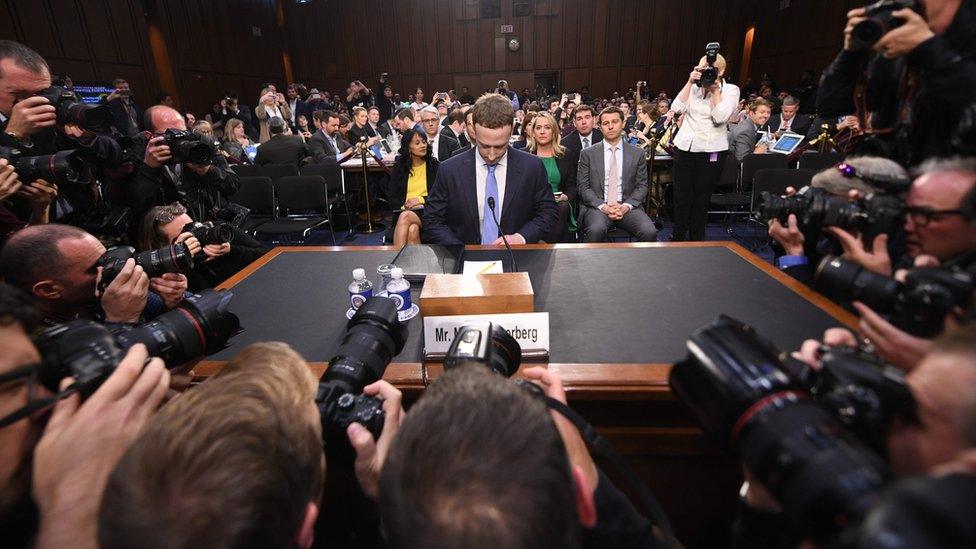Why Facebook's Mark Zuckerberg shouldn't be scared of men in tights
- Published

A meeting of the DCMS committee empty-chairing Mark Zuckerberg
If a man in tights comes to your door and demands that you hand over private documents or come to Parliament, do you need to comply?
That is an issue raised this week by the Digital, Culture, Media and Sport Committee, who sent a parliamentary official to a hotel in London to inform an American businessman that he was obliged to supply them confidential documents.
The Observer reported that the committee "invoked a rare parliamentary mechanism to compel the founder of a US software company, Six4Three, to hand over the documents during a business trip to London... He was told he risked fines and even imprisonment if he didn't hand over the documents."
These files were contentious: in fact, the company had been barred from publishing them by a court in the US. But he gave them over.
The documents related to Facebook, a company whose founder, Mark Zuckerberg, has - by contrast - ignored repeated requests to appear before the committee.
Yesterday, Mr Zuckerberg was empty-chaired by committee.
This is all a strange turn of events. Our Parliamentary committees are entitled to summon people and documents in order to conduct inquiries.
If you fail to heed their grand summons, which may be delivered by the Serjeant-at-Arms, you can be considered "in contempt of Parliament" - much as failing to comply with a court order can lead you to contempt of court.
So which of these two companies has understood the state of the law?
Probably Facebook. If the Six4Three executive had refused to comply, he is likely to have escaped without anything more than a stern letter. For all the theatre, information and testimony requested by committees from private institutions and individuals is basically volunteered.
Take the case of Dominic Cummings, the former Vote Leave bigwig, who refused to attend the same committee earlier this year. He also annoyed the committee, blogging about their summons in intemperate terms.
The chair of the committee, Damian Collins, told MPs: "There has to be some kind of sanction for someone who has been blatant in their behaviour and their language and in the contempt that they have shown for Parliament."
We await a verdict on that issue: the Commons has asked its privileges committee to consider an appropriate punishment.
But it is rather unlikely that Mr Cummings is going to see the inside of a cell or face a fine. MPs' right to vote to imprison people for not complying is more hypothetical than real.

Why MPs cannot lock you up
Why? Well, there are a few issues worth considering here.
There are issues of grand principle. Other countries have explicit divisions of legislative and judicial authority written into law. We do not; Parliament still sometimes considers itself a peculiar sort of court.
But the principle that MPs should not vote to prosecute individuals is long-established here for good reason.
Setting aside that it would be a circus to have the House of Commons conduct a trial, part of the rationale for wanting a division between courts and lawmakers is that courts are built to do this.
Courts have appeals processes. It is not clear who could do that for Parliament. Who would step in if a group of zealous MPs were to over-reach and start interfering in a live court case?
What if they needlessly intrude on innocent people's lives with arrest and document-seizure powers?
Take this seriously: in the worst-case scenario, these are powers that would enable a party with a majority in parliament to seize documents on the lives of their opponents, and throw them into prison if they dared not comply.
In another age, MPs used to punish enemies of the king through so-called Bills of Attainder.
Maybe things could never get that bad: it is assumed by clerks that any attempt to imprison or fine individuals would immediately lead to challenge in a court. But this would be a very big constitutional fight; Parliament, remember, is protected by something called "privilege".
Judges are not supposed to be able to examine or impede the work of our legislature.
But once you start locking members of the public up, courts might not stand aside. That is, bluntly, their line of work.
It would invite a stand-off between the judiciary and legislature. (Memo to MPs: I would bet on the judiciary.)
There are more arcane reasons why MPs should be wary of this. One is close to my heart: there are special protections within our laws on contempt of court and data protection, for example, that are designed to shield journalists seeking to protect confidential sources from disclosure.
There are no such rules that would bind the hands of MPs.
Hence the verdict of Chris Bryant MP, speaking in a debate on Mr Cummings' conduct: "The idea of sending the Serjeant at Arms is nice and quaint. Yes, undoubtedly he can deliver a letter, but I do not think that he has subpoena powers any more. It is also slightly strange for a political body to arrest somebody, which is, in effect, what we have to be able to do.
"The idea of politicians deciding on a political motion whether somebody should be arrested is, I am glad to say, anathema... We simply do not believe in that way of pursuing justice any more."

Mark Zuckerberg was forced to testify before the US Congress
Giving committees teeth
That is not to say that there is no way to square this circle. There are a lot of advocates for stronger powers for committees, and they often note that American Congressional committees have more teeth and can subpoena people for documents and demand their attendance.
Mr Zuckerberg has been compelled to testify to them.
The US has a legal concept known as "inherent contempt" of Congress, which is similar to our "Contempt of Parliament".
But their committees' teeth really comes from the fact that, since 1857, the committees can pass the subpoena on to a US attorney to prosecute non-compliers in a court.
Or, since 1978, they may seek a civil judgment from a federal court so that non-compliance would be contempt of court instead of contempt of Congress.
The trick is that both of those processes introduce a court into the mix, so there is a judicial check on abuse of power by committees.
That might be a route for our MPs to go if they want contempt of parliament to become a real thing.
There are good reasons for people to co-operate with committees - mostly they want to be seen to co-operate. But be suspicious of anyone who claims to have been coerced into doing so.
You can watch Newsnight on BBC 2 weekdays 22:30 or on iPlayer. Subscribe to the programme on YouTube, external or follow them on Twitter, external.